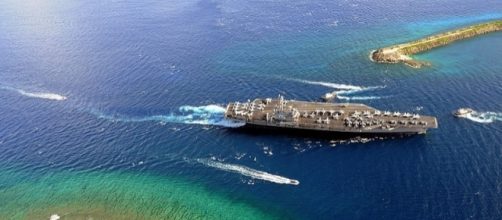The world is on tenterhooks after North Korea threatened to carry out a nuclear attack on the United States and has identified the date and the location of its target. It has also indicated a line of action which would involve Japan because it intends to send its rockets flying over that country to strike Guam. Obviously, that has set the alarm bells ringing and Japan is reorganizing its defense mechanism to counter the threat by bringing its missile defense systems into the heart of the capital Tokyo.
Not everyone is getting in a panic
Daily Mail UK reports that North Korea plans to launch an attack that will land close to Guam by mid-August and it will be carried out by four Hwasong-12 missiles that will fly across Japan.
Nevertheless, CNN reported that in Guam, there are still tourists visiting as the general consensus seems to be that North Korea is mostly rhetoric.
Therefore, preparatory work has been taken up by countries like Japan, South Korea, and Hawaii who feel that they are under immediate threat of a nuclear attack from North Korea. The former two are allies of the United States while Hawaii is a base of the USAF.
The Japanese have reacted by purchasing bomb shelters and radiation-blocking air purifiers. In the opinion of Defense Minister Itsunori Onodera of Japan, a missile attack on the island would be a national emergency as it would threaten its very existence. If that happens, his country would act in self-defense and activate its missile defense system.
According to the provisions of a recent law, the country can deploy its military to defend the US and other allies when they come under enemy attack.
Hawaii knows that it would take approximately 20 minutes for an ICBM from North Korea to strike the island. However, the Pacific Command would take a few minutes to characterize a launch and the people would have about 15 minutes to seek out shelter.
It is working out a system to warn its people of an impending attack.
South Korea has indicated that it would strengthen its defenses but the country seems to be calm and not panic stricken. Its response is lukewarm as they feel that the threats will not materialize. In any case, it has a system to alert its civilians via automated messages to their mobile telephones.
Apart from that, there are more than 3,000 bunkers in Seoul and underground train stations and parking garages.
What does the future hold?
It appears that North Korea is not inclined to pay heed to any diplomatic solution. Kim Jong-un, the leader, is unperturbed by the fresh round of sanctions and has taken it in his stride. President Donald Trump had suggested to President Xi Jinping of China that the country exerts pressure on their ally and it is still not clear whether China will be able to persuade North Korea from aggravating the situation.
The situation is tense and volatile. An unpredictable leader is a danger to the world and if North Korea does go ahead with a nuclear attack on the United States, it could be the point of no return.


